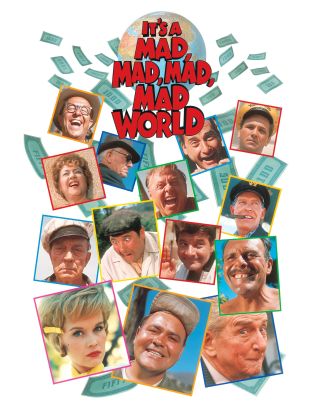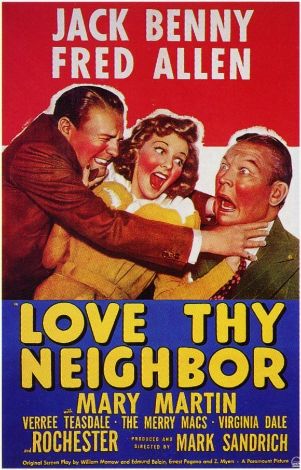Though born in a Chicago hospital, entertainer Jack Benny was a Waukegan boy through and through. The son of a Polish immigrant haberdasher, Benny studied the violin from an early age (he really could play, though he was certainly no virtuoso), and managed to find work in local theatre orchestras. As a teenager, Benny gave vaudeville a try with a musical act in partnership with pianist Cora Salisbury, but this first fling at show business was only fitfully successful. During World War I, Benny was assigned to the Great Lakes Naval Training Center, where, while appearing in camp shows, he first began telling jokes in between violin selections. Benny returned to vaudeville with a comedy act, slowly building himself up into a headliner. He made his first radio appearance on Ed Sullivan's interview show on March 29, 1932; within a year he had his own show, which would evolve over the next two decades into one of radio's most popular programs. He met with equal success when he moved into television in 1950. There are few comedy fans in existence who aren't familiar with the character Benny played on the air: The vain, tone-deaf, penny-pinching, eternal 39-year-old who spent his life being flustered and humiliated by his supporting cast (Mary Livingstone, Eddie "Rochester" Anderson, Dennis Day, Frank Nelson, Mel Blanc, Don Wilson et. al.); nor need his fans be reminded that this character developed gradually, rather than springing full-blown upon the world way back in 1932. What is usually de-emphasized in the many accounts of Benny's life and career is his sizeable body of movie work. Benny himself insisted that most of his films were no good, and many casual viewers have been willing to accept his word on this. Actually, Benny's films, while not all classics, were by and large moneymakers, and never anything to be truly ashamed of. His first feature appearance was as the wisecracking emcee of MGM's The Hollywood Revue of 1929. He followed this with a comic-relief role in Chasing Rainbows (1930) and an uncharacteristic straight part in the low-budget The Medicine Man (1930). He was a perfectly acceptable semicomic romantic lead in It's in the Air (1935), Artists and Models (1936), Artists and Models Abroad (1936), and in his appearances in Paramount's College and Big Broadcast series. Whenever Benny expressed displeasure over his film career, he was usually alluding to those pictures that insisted upon casting him as Benny the Famous Radio Comedian rather than a wholly different screen character. Transatlantic Merry-Go-Round (1934), Man About Town (1939) and Buck Benny Rides Again (1940), though enjoyable, are totally reliant upon Benny's pre-established radio character and "schtick" for their laughs, and as such aren't nearly as effective as his actual radio appearances. His most disappointing movie vehicle was Love Thy Neighbor (1940), designed to cash in on his phony feud with fellow radio humorist Fred Allen. Not only was the film uninspired, but also outdated, since the feud's full comic value had pretty much peaked by 1937. Many of Benny's best films were made during his last four years in Hollywood. 1941's Charley's Aunt was a lively adaptation of the old Brandon Thomas theatrical chestnut (though it did have to work overtime in explaining why a man in his forties was still an Oxford undergraduate!); 1942's George Washington Slept Here, likewise adapted from a stage play (by George S. Kaufman and Moss Hart), was a reasonably funny comedy of frustration; and yet another stage derivation, 1943's The Meanest Man in the World (based on a George M. Cohan farce), allowed Benny to go far afield from his truculent radio persona by playing a man who is too nice for his own good. Benny's finest film, bar none, was the Ernst Lubitsch-directed To Be or Not to Be (1942), in which the comedian was superbly cast as "that great, great Polish actor" Joseph Tura. Benny's final starring feature, the much maligned Horn Blows at Midnight (1945), was an enjoyable effort, and not by any means the unmitigated disaster he used to joke about on radio. The film's problem at the box-office was that it was a comedy fantasy, and audiences in 1945 had had their fill of comedy fantasies. After Horn Blows at Midnight, Benny's theatrical film appearances were confined to guest spots and unbilled gag bits (e.g. The Great Lover and Beau James). In 1949, Benny produced a Dorothy Lamour movie vehicle, The Lucky Stiff; in addition, his J&M Productions, which produced his weekly television series from 1950 through 1965, was also responsible for the moderately popular TV adventure series Checkmate (1960-62). In 1974, Benny was primed to restart his long-dormant movie career by appearing opposite Walter Matthau in the 1975 film adaptation of Neil Simon's play The Sunshine Boys; unfortunately, he died of cancer before filming could begin, and the film ultimately starred George Burns and Matthau.
Jack Benny
Share on
Biography by AllMovie
Movie Highlights
Factsheet
- Dropped out of high school to pursue a career playing the violin, an instrument that became a prop in his act.
- A far better violinist than he made himself out to be, he owned a real Stradivarius (made in 1724) that he often played in charity events.
- Cheapness was another part of the Benny persona, but he was said to be one of Hollywood's biggest tippers.
- Hosted the Academy Awards in 1944 and 1947.
- Made provisions in his will for his widow, Mary Livingstone, to receive a red rose every day for as long as she lived.
- Inducted into the Television Academy Hall of Fame posthumously in 1988.
- The California town of Rancho Cucamonga, made famous by Benny in his radio and TV skits, erected a seven-foot bronze memorial statue of him in 1993.
- When the price of a U.S. postage stamp was raised to 39 cents, a campaign began to feature Benny on a stamp since the comedian always claimed to be 39 years old throughout his career. Unfortunately, the campaign was unsuccessful.


